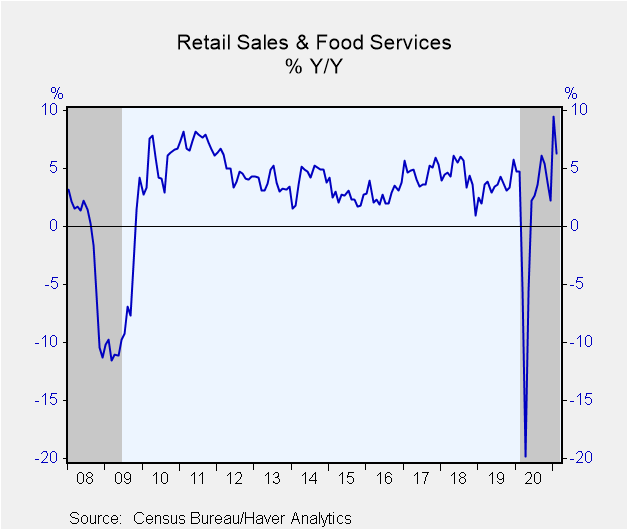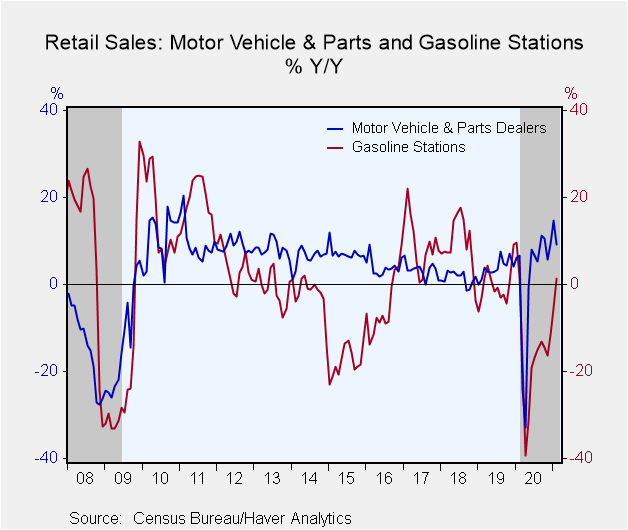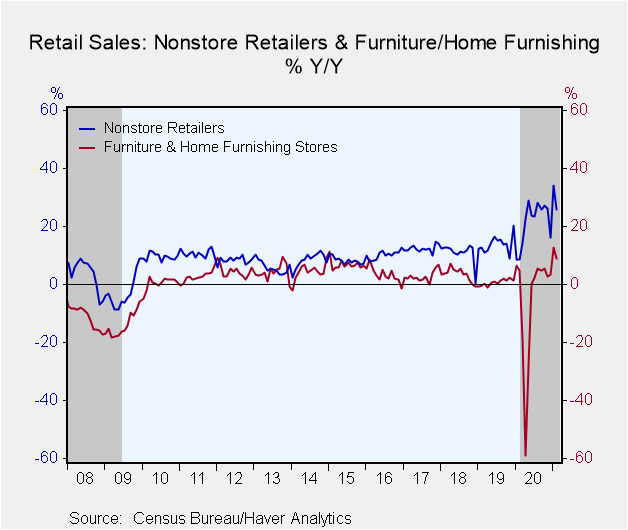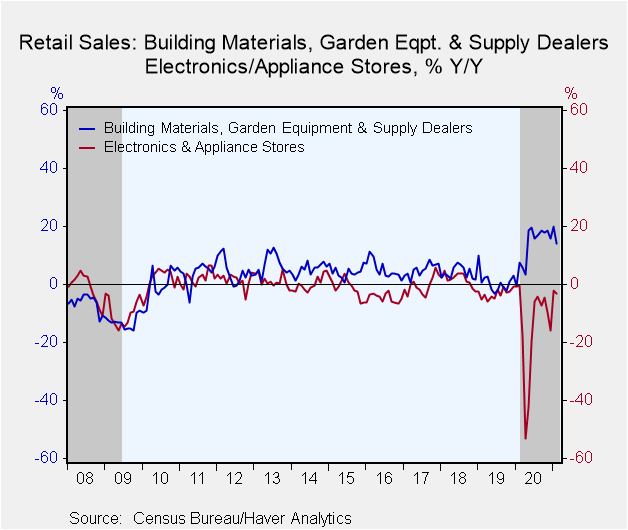 Global| Mar 16 2021
Global| Mar 16 2021U.S. Retail Sales Are Held Back by Severe Winter Weather in February
by:Tom Moeller
|in:Economy in Brief
Summary
• Weakness is broad-based. • Decline follows January spending boost from stimulus checks. Total retail sales including food service and drinking establishments declined 3.0% (+6.3% y/y) during February after rising 7.6% in January, [...]
• Weakness is broad-based.
• Decline follows January spending boost from stimulus checks.
Total retail sales including food service and drinking establishments declined 3.0% (+6.3% y/y) during February after rising 7.6% in January, which was strengthened by a second round of government stimulus checks. The January gain was revised from 5.3%. The Action Economics Forecast Survey expected a 0.3% slip. Retail sales excluding motor vehicles and parts declined 2.7% last month (+5.5% y/y) after surging 8.3% in January, revised from 5.9%. Sales have fallen in four of the last five months. A 0.3% February rise had been expected.
Sales in the retail control group, which excludes autos, gas stations, building materials and food services, fell 3.5% last month (+10.2% y/y) after surging 8.7% in January, revised from 6.0%.
Motor vehicle purchases declined 4.2% in February (+9.2% y/y) following a 5.0% January rise. The decline compares to a 5.6% weakening (-6.7% y/y) in unit sales of light vehicles. Nonstore retail sales were off 5.4% (+25.9% y/y) after surging 16.8% in January. General merchandise store sales were off 5.4% (+4.2% y/y), the fourth decline in five months. Department store sales declined 8.4% (-14.5% y/y) after surging 20.6% in January. Clothing & accessory store sales fell 2.8% (-11.3% y/y) after two months of firm increase. Furniture & home furnishings sales weakened 3.8% (+8.9% y/y) following a 12.9% jump while sales of electronics & appliances eased 1.9% (-3.1% y/y) after surging 16.7% in January. Sporting goods, hobby and book store sales declined 7.5% (+15.4% y/y) after rising 10.3%.
Building materials sales fell 3.0% (+14.2% y/y) with the severe weather after increasing 4.9% in January. Reflecting higher prices, gasoline service station sales rose 3.6% (1.4% y/y), the third straight month of strong increase.
In the nondiscretionary sales categories, food & beverage store sales held steady in February (11.7% y/y) after gaining 2.4% in the prior month. Health personal care store sales eased 1.3% (+5.4% y/y) following a 2.3% rise.
Sales at restaurants and drinking establishments posted a 2.5% decline (-17.0% y/y) in February after rising 9.1% in January.
The retail sales data can be found in Haver's USECON database. The Action Economics forecast is in the AS1REPNA database.
Did the Federal Reserve Anchor Inflation Expectations Too Low? from the Federal Reserve Bank of Kansas City is available here.
| Retail Spending (% chg) | Feb | Jan | Dec | Feb 0Y/Y | 2020 | 2019 | 2018 |
|---|---|---|---|---|---|---|---|
| Total Retail Sales & Food Services | -3.0 | 7.6 | -1.3 | 6.3 | 0.4 | 3.5 | 4.4 |
| Excluding Autos | -2.7 | 8.3 | -2.1 | 5.5 | 0.2 | 3.5 | 5.2 |
| Retail Sales | -3.1 | 7.4 | -0.9 | 9.5 | 3.2 | 3.4 | 4.2 |
| Retail Less Autos | -2.7 | 8.1 | -1.7 | 9.6 | 3.8 | 3.3 | 5.1 |
| Motor Vehicle & Parts | -4.2 | 5.0 | 1.8 | 9.2 | 1.0 | 3.7 | 1.4 |
| Food & Beverage Stores | 0.0 | 2.4 | -1.6 | 11.7 | 11.1 | 2.5 | 2.9 |
| Gasoline Service Stations | 3.6 | 5.9 | 7.5 | 1.4 | -15.6 | -0.5 | 9.3 |
| Food Service & Drinking Places | -2.5 | 9.1 | -4.8 | -17.0 | -19.3 | 4.6 | 5.8 |
Tom Moeller
AuthorMore in Author Profile »Prior to joining Haver Analytics in 2000, Mr. Moeller worked as the Economist at Chancellor Capital Management from 1985 to 1999. There, he developed comprehensive economic forecasts and interpreted economic data for equity and fixed income portfolio managers. Also at Chancellor, Mr. Moeller worked as an equity analyst and was responsible for researching and rating companies in the economically sensitive automobile and housing industries for investment in Chancellor’s equity portfolio. Prior to joining Chancellor, Mr. Moeller was an Economist at Citibank from 1979 to 1984. He also analyzed pricing behavior in the metals industry for the Council on Wage and Price Stability in Washington, D.C. In 1999, Mr. Moeller received the award for most accurate forecast from the Forecasters' Club of New York. From 1990 to 1992 he was President of the New York Association for Business Economists. Mr. Moeller earned an M.B.A. in Finance from Fordham University, where he graduated in 1987. He holds a Bachelor of Arts in Economics from George Washington University.










